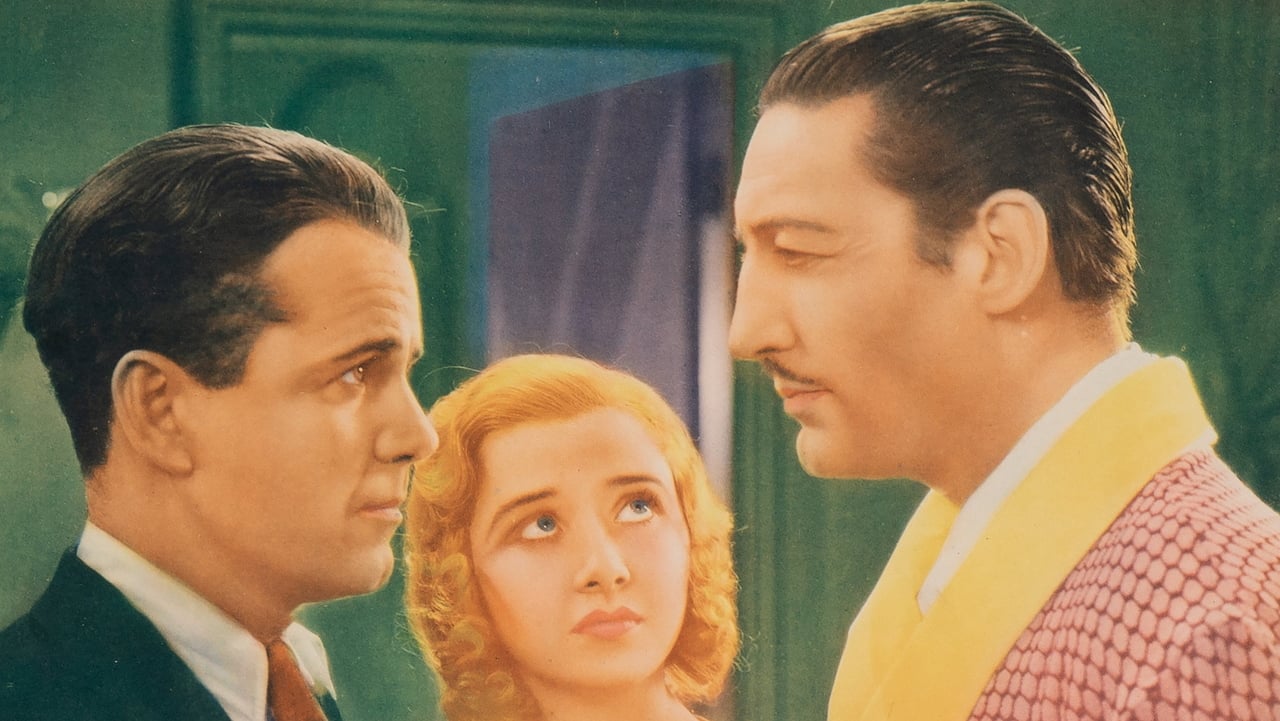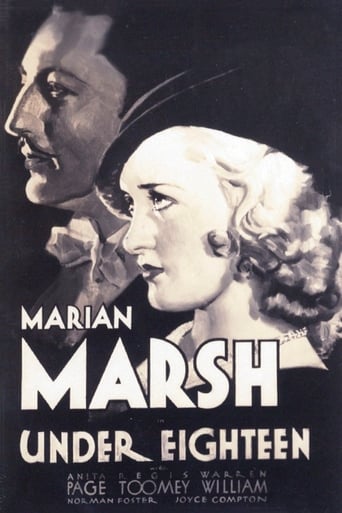

What a ridiculous title. Ignore it, it has nothing to do with this movie about two sisters, one of whom (Anita Page) is married to an abusive deadbeat (Norman Foster), and the other of whom (Marian Marsh) is dating a humble deliveryman (Regis Toomey). As Marsh witnesses Page's marriage and her need for money for a divorce, she resolves to marry for money instead of love, and later catches a rich man's eye (Warren William) when she fills in for a model. She goes up to William's wild penthouse pool party where William practically salivates over her, asking her to swim in his suave voice by saying "Why not take off your clothes and stay awhile?" He's great in the film, and it's a pretty strong cast. There are the seemingly requisite pre-code underwear scenes, as well as some pretty snappy 30's dialog between the couples, which keep the film entertaining, but I hated the way the film played out, so it's a mixed bag for me.
... View More"Under 18" is a charming pre-Code film that includes the best of the genre: beautiful art deco sets, stunning period fashions, and scenes that were titillating for their time.According to notes in the bio of Ms. Marsh, the film was not a critical success, but I do not understand why. The film's best asset is the performance of Marian Marsh herself, who is cute as a Kewpie doll. She plays Margie, a seamstress in the back room of Maison Ritz--a couture fashion house--where she is enthralled by the happenings in the front salon, where rich men bring their women to select expensive gowns and furs.Margie's friends and relatives exist on the lower end of the financial spectrum, trying to get ahead. Her boyfriend, Jimmy, is an optimist. He always tells her that good times are just around the corner. But when times get worse, Margie is tempted to take a short cut.In 1931, as skyscrapers captured the imagination of the public, it must have felt like there were two worlds--the life of penthouse luxury that existed in the sky and the life of the hoi polloi down on street level. This film captures that concept very well (similar to Fitzgerald's vision of a distant, unattainable East Egg in "The Great Gatsby").There is nothing about this film that I would criticize. It offers a wonderful view of the life and times of the early thirties, including the changing mores that some saw as opportunity and others saw as the demise of traditional values.
... View MoreThe depression era drama "Under Eighteen" tells the story of Margie, a charming young woman in her late-teens with a heart of gold who wishes for something more for herself and her mother, who she supports with the little she can scratch together as a seamstress.A damper is put on her plans when her pregnant older sister brings along her somewhat abusive deadbeat husband and young baby to live with them. Things are complicated further when Margie tries to scrounge some cash together to help her sister pay the impending divorce attorney (although a brief allusion is also made to an abortion). What lengths will she go to for money to help her family?"Under Eighteen" is an interesting film with snappy dialogue that follows a surprisingly empowered female lead through several chance encounters. References are made to several taboo subjects of the time, but it's not as out and out salacious as might be expected from the title, but the film certainly winks at the audience a number of times as it hints at what's really on it's mind.
... View MoreThis song was popular in the depression, so it's not a big surprise that one of the characters in this movie whistles it on the way to work. By the end of this movie, "happy days ARE here again," but for most of the picture you sure wouldn't think so! Directed by the capable Archie Mayo, this movie offers a chance for viewers today to see a wonderful contrast between the have and have nots of the 1930's.Young Margie (played by Marian Marsh) who must be "under eighteen," works to help support her family now that her father has died. The family now consists of her older sister Sophie (Anita Page), her husband Alf, and their little baby. Margie is a seamstress in a NYC shop that makes and sells fashionable gowns. Margie's nobody's dummy--she sees the beautiful models attracting rich sugar daddies and dreams of the life she could have...if only! Her poor-but-honest-and-hard-working boyfriend, Jimmy (Regis Toomey) offers her stability and respectability , which she accepts until Sophie shows her a side of married life that is undesirable. One day at work, she meets ladies man Howard Raymond (Warren William), gets the opportunity to model a beautiful fur coat for him, and he charms her. A swiss cheese sandwich, an invitation to his penthouse, and a desperate need for money lead to trouble for Margie.This pre-Code is rich in 1930's flavor. Raymond's penthouse apartment is an Art Deco delight, while the apartment where Margie's family lives is the exact opposite. Warren William is an absolute standout as the seducer of young women, a role he played many times, but no time better than in this movie! When young Margie shows up at his penthouse, he is outside on the roof, swimming in his pool. He invites her to stay and swim with the comment, "Take off your clothes and stay awhile." I was lucky to accidentally catch this movie on TCM. It doesn't show very often, but would be certainly worth your time, if it appears in the line up again.
... View More